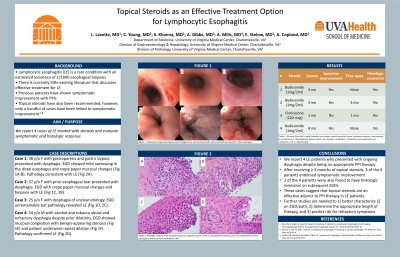Monday Poster Session
Category: Esophagus
P1922 - Topical Steroids: An Effective Treatment Option for Lymphocytic Esophagitis
Monday, October 23, 2023
10:30 AM - 4:15 PM PT
Location: Exhibit Hall

Has Audio
- LL
Laura E. Lavette, MD
University of Virginia Medical Center
Charlottesville, VA
Presenting Author(s)
Laura E. Lavette, MD1, Christopher Young, MD1, Amanda Gibbs, MD2, Anne M. Mills, MD1, Edward B. Stelow, MD1, Andrew P. Copland, MD2
1University of Virginia Medical Center, Charlottesville, VA; 2University of Virginia, Charlottesville, VA
Introduction: Lymphocytic esophagitis (LE) is rare condition with an estimated incidence of 1/1000 esophageal biopsies. There is little existing literature that discusses effective treatment for LE. Previous patients have shown symptomatic improvement with PPIs. Topical steroids have also been recommended; however, only a handful of cases have been linked to symptomatic improvement.1-3 We report 4 cases of LE treated with topical steroids.
Case Description/Methods: Patient 1 is a 38 year-old female with history of gastroparesis and gastric bypass who presented with dysphagia. EGD showed mucosal changes and biopsy was consistent with LE (Fig 1A). She completed 3 months of budesonide with symptomatic improvement. Repeat EGD showed normal pathology. Patient 2 is a 37 year-old female with prior esophageal tear who presented with dysphagia. EGD appeared normal but biopsies revealed LE (Fig 1B). She took budesonide for 3 months; while she endorsed improvement in dysphagia, repeat EGD showed persistent LE. Patient 3 is a 25 year-old female with dysphagia similarly found to have LE (Fig 1C). She received one month of inhaled fluticasone without improvement in symptoms; however, repeat EGD showed resolution of LE. Patient 4 is a 54 year-old male with alcohol/tobacco abuse and refractory dysphagia despite multiple prior dilations. EGD showed esophageal rings with benign-appearing stenosis and pathology was consistent with LE (Fig 1D). He completed 4 months of budesonide with improvement in dysphagia; unfortunately, repeat EGD showed ongoing LE.
Discussion: LE is a rare condition characterized using specific histologic, clinical, and endoscopic elements. Given its low incidence, effective treatment strategies are not well understood. We report 4 LE patients with ongoing dysphagia despite being on appropriate PPI therapy. After receiving ≥ 3 months of topical steroids, 3 of the 4 patients endorsed symptomatic improvement. 2 of the patients were found to have histologic remission on subsequent EGDs. These cases suggest that topical steroids are an effective adjunct to PPI therapy in the LE patient population. Further studies are needed to determine the appropriate length of therapy and risk of refractory symptoms.
1. Pasricha S, et al. Lymphocytic Esophagitis: An Emerging Clinicopathologic Disease Associated with Dysphagia. 2016: 2935–41.
2. Kasirye Y, et al. Lymphocytic Esophagitis Presenting as Chronic Dysphagia. 2012: 83–4.
3. Romana B, et al. Lymphocytic Esophagitis: Steroids Make a Difference. 2016: S776-S777.

Disclosures:
Laura E. Lavette, MD1, Christopher Young, MD1, Amanda Gibbs, MD2, Anne M. Mills, MD1, Edward B. Stelow, MD1, Andrew P. Copland, MD2. P1922 - Topical Steroids: An Effective Treatment Option for Lymphocytic Esophagitis, ACG 2023 Annual Scientific Meeting Abstracts. Vancouver, BC, Canada: American College of Gastroenterology.
1University of Virginia Medical Center, Charlottesville, VA; 2University of Virginia, Charlottesville, VA
Introduction: Lymphocytic esophagitis (LE) is rare condition with an estimated incidence of 1/1000 esophageal biopsies. There is little existing literature that discusses effective treatment for LE. Previous patients have shown symptomatic improvement with PPIs. Topical steroids have also been recommended; however, only a handful of cases have been linked to symptomatic improvement.1-3 We report 4 cases of LE treated with topical steroids.
Case Description/Methods: Patient 1 is a 38 year-old female with history of gastroparesis and gastric bypass who presented with dysphagia. EGD showed mucosal changes and biopsy was consistent with LE (Fig 1A). She completed 3 months of budesonide with symptomatic improvement. Repeat EGD showed normal pathology. Patient 2 is a 37 year-old female with prior esophageal tear who presented with dysphagia. EGD appeared normal but biopsies revealed LE (Fig 1B). She took budesonide for 3 months; while she endorsed improvement in dysphagia, repeat EGD showed persistent LE. Patient 3 is a 25 year-old female with dysphagia similarly found to have LE (Fig 1C). She received one month of inhaled fluticasone without improvement in symptoms; however, repeat EGD showed resolution of LE. Patient 4 is a 54 year-old male with alcohol/tobacco abuse and refractory dysphagia despite multiple prior dilations. EGD showed esophageal rings with benign-appearing stenosis and pathology was consistent with LE (Fig 1D). He completed 4 months of budesonide with improvement in dysphagia; unfortunately, repeat EGD showed ongoing LE.
Discussion: LE is a rare condition characterized using specific histologic, clinical, and endoscopic elements. Given its low incidence, effective treatment strategies are not well understood. We report 4 LE patients with ongoing dysphagia despite being on appropriate PPI therapy. After receiving ≥ 3 months of topical steroids, 3 of the 4 patients endorsed symptomatic improvement. 2 of the patients were found to have histologic remission on subsequent EGDs. These cases suggest that topical steroids are an effective adjunct to PPI therapy in the LE patient population. Further studies are needed to determine the appropriate length of therapy and risk of refractory symptoms.
1. Pasricha S, et al. Lymphocytic Esophagitis: An Emerging Clinicopathologic Disease Associated with Dysphagia. 2016: 2935–41.
2. Kasirye Y, et al. Lymphocytic Esophagitis Presenting as Chronic Dysphagia. 2012: 83–4.
3. Romana B, et al. Lymphocytic Esophagitis: Steroids Make a Difference. 2016: S776-S777.

Figure: Figure 1. Histologic sections show stratified epithelium with numerous intraepithelial lymphocytes and intraepithelial edema (spongiosis) with occasional dyskeratotic cells.
Disclosures:
Laura Lavette indicated no relevant financial relationships.
Christopher Young indicated no relevant financial relationships.
Amanda Gibbs indicated no relevant financial relationships.
Anne Mills indicated no relevant financial relationships.
Edward Stelow indicated no relevant financial relationships.
Andrew Copland indicated no relevant financial relationships.
Laura E. Lavette, MD1, Christopher Young, MD1, Amanda Gibbs, MD2, Anne M. Mills, MD1, Edward B. Stelow, MD1, Andrew P. Copland, MD2. P1922 - Topical Steroids: An Effective Treatment Option for Lymphocytic Esophagitis, ACG 2023 Annual Scientific Meeting Abstracts. Vancouver, BC, Canada: American College of Gastroenterology.
